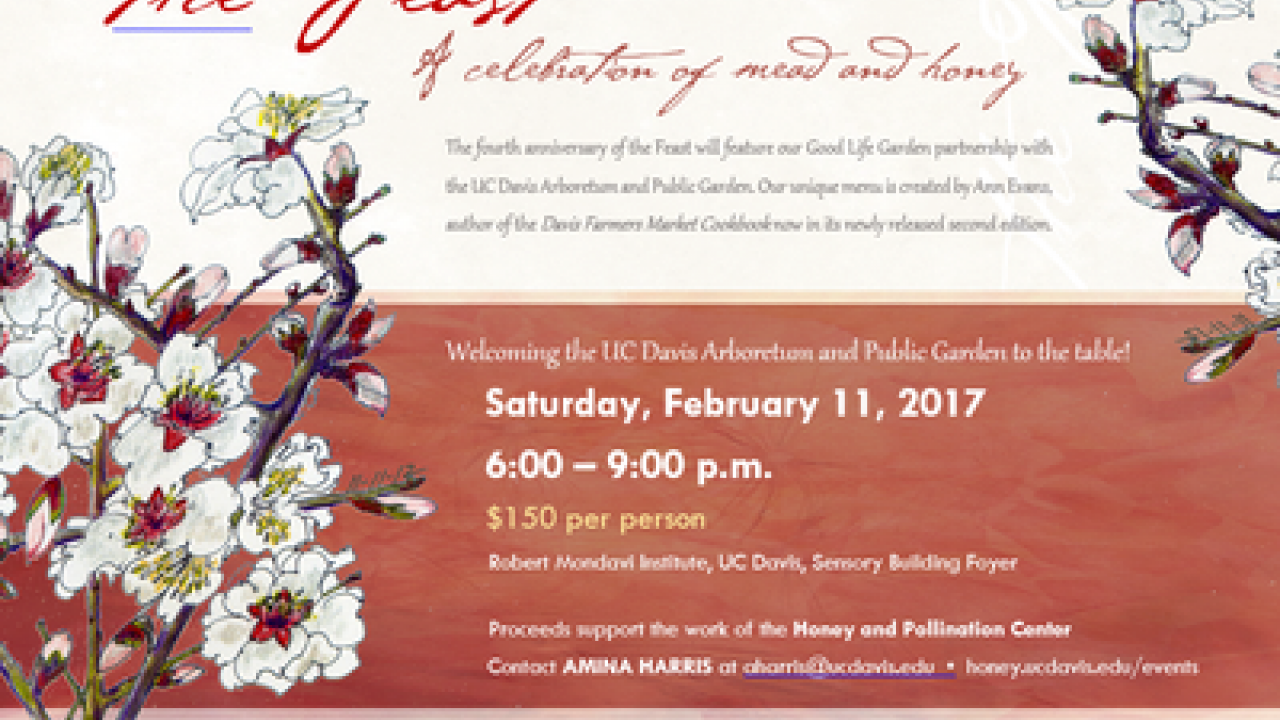
2017 Feast: A Celebration of Mead and Honey
The Feast: A Celebration of Mead and Honey is a tasty way to celebrate pollinators, honey, mead and all the wonderful fruits and vegetables they help bring to the table. This year’s Feast will be held Saturday evening, February 11 at 6pm in the Sensory Building Foyer, Robert Mondavi Institute, UC Davis.
In the fourth year of the Feast, the Center has invited the UC Davis Arboretum and Public Garden to the table. “This year the Honey and Pollination Center is working with the UC Davis Arboretum and Public Garden to create a re-envisioned pollinator friendly ‘kitchen garden’ as part of the Good Life Garden situated at the Robert Mondavi Institute,” says director of the Center, Amina Harris. She continues, “The Center is very excited to work cooperatively with the Arboretum. We are creating a team to look at plantings, irrigation concepts, educational signage and even the installation of a beehive.” The ideas the interdisciplinary team comes up with will be presented at the dinner in February.
This year’s Feast is redolent with seasonal flavors. The menu has been created by Ann Evans, author of the Davis Farmers Market Cookbook, now in its second edition with additional recipes and glorious photographs. The evening will start with live music, hors d’oeuvres and Honey Stingers featuring ginger mead from Schramm’s Mead in Michigan. Select wines, honey lemonade and sparkling mead will also be served paired to each course. A rich tomato aspic salad will be followed by chicken with plumped dried figs and apricots. Roasted musquée de province squash with couscous will fill out the main course. A cheese interlude will accompany a dessert mead flight with a perfect closure to a winter feast – a dessert of pears with blue cheese walnuts and honey.
Clare Hasler Lewis, executive director of the Institute says, “The Good Life Garden is central to Robert Mondavi’s vision for the Institute grounds. He, and his wife Margrit, were passionate about how important it is to link wine, art, music and wonderful food all together.”
“We are thrilled to be able to plan the next phase of the Good Life Garden with our partners at the Robert Mondavi Institute, including the Honey & Pollination Center and other academic partners in the College of Agricultural & Environmental Sciences,” says Kathleen Socolofsky, assistant vice chancellor and director of the Arboretum and Public Garden.
Up until just a year ago, the garden was a center of lush vegetation changing from season to season. Last year, the Department of Viticulture and Enology installed a huge water catchment system underneath the garden as part of their program in sustainability. Much of the garden was pulled out during construction. Now that the water system is in place, it is time to renew the garden beds. A team of staff and faculty from the Robert Mondavi Institute, the Arboretum, the department of Entomology and Nematology will be looking at sustainable irrigation systems, native plants for native pollinators, herbs and, at the same time, making the garden accessible to the public. The dinner will be a kick-off to this ongoing collaboration.
The Honey and Pollination Center has become a very active organization at the Institute. Leading the way in the development and science of mead, the Center has hosted, along with the Department of Viticulture and Enology, five courses on making mead. This year, a Mead Making Bootcamp will be offered alongside the Introduction to Mead course in mid-January. Each course has sold out and attracted attendees from across the United States, Canada, India, Australia, South America and England.
Mead, a fermented blend of honey, water and often fruits, yeast, or spices, has been dated to about 7000 BCE. Ceramic shards found in Jiahu, Henan Province, China held a mead-like residue according to Dr. Patrick McGovern, the leading authority on ancient alcoholic beverages. According to the TTB the number of meaderies in the United States has grown in the last ten years from 30-40 meaderies to over 300.
In addition to mead, the Center has been working with members of the Department of Entomology and Nematology to bring an array of specialized programs to campus.
The third ‘Bee Symposium: Keeping Bees Healthy’ will be held Sunday, May 7th featuring an array of speakers from the UC system and across the country. The Symposium will be held in tandem with the first California Honey Festival located in downtown Woodland, CA on May 6th.
Proceeds from the dinner will be used to support the outreach and education programs of the Honey and Pollination Center, whose mission is “to make UC Davis a leading authority on bee health, pollination and honey quality”, according to the Center’s director, Amina Harris.
Tickets for the dinner are $150 and available online at: http://honey.ucdavis.edu/events/mid-winter-beekeepers-feast. For more information contact Amina Harris; aharris@ucdavis.edu.
